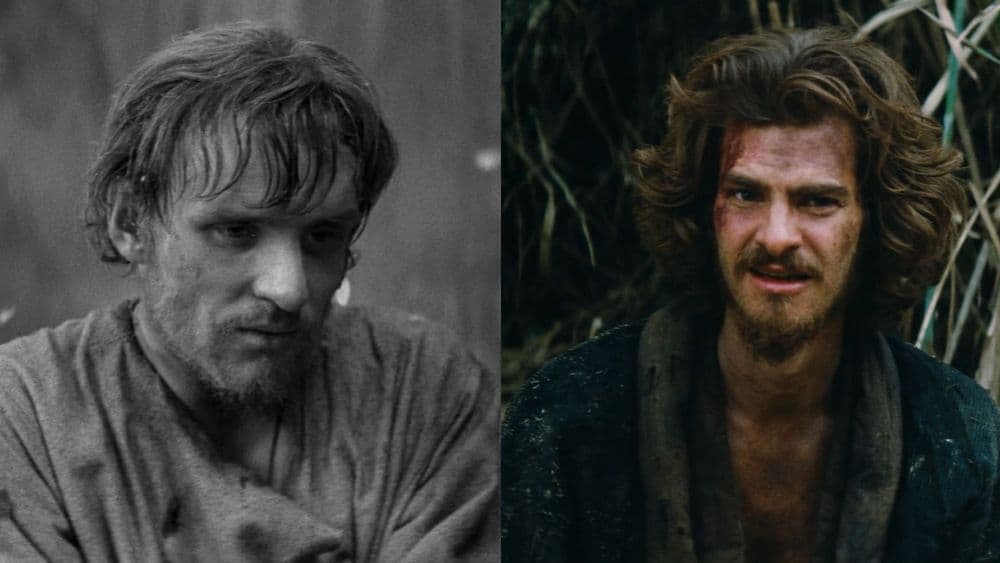Notes on Art and Sacrifice
Tarkovsky's Andrei Rublev, Scorsese's Silence
May 20, 2023

My original idea for this site was to post shorter, more frequent entries, initial reactions to things I’ve consumed or was working on to start writing a bit again. So far I’ve failed in that regard. I’ve been treating every post like a sculpture to be carefully carved and sanded smooth rather than a canvas on which to haphazardly throw paint. I’m hoping to let go a bit more, and perhaps that will result in more entries. Here’s one, hopefully:
I coincidentally watched Tarkovsky’s Andrei Rublev and Scorsese’s Silence this week, two period-piece religious dramas that see clergymen forced to choose between the structural dictates of their respective Christian sects and the wellbeing of the people they’re supposedly serving.
In Tarkovsky’s film set in 14th century Russia, the titular artist and monk has been commanded by his bishop, at the request of the local political authority the Grand Duke, to paint an extravagant mural of The Last Judgment on the walls of the town’s church to scare the peasants into a life of religious fealty. He delays the mural for months, eventually disclosing to his companion his discomfort in depicting suffering, saying he’d rather inspire his audience than intimidate them.
Scorsese’s protagonist, a Jesuit missionary infiltrating 17th century Japan named Rodrigues, sees success early in the film, ministering to the peasant Christians who practiced their faith in secret after the Shimabara Rebellion and the following suppression of Christianity. This is soon dissipated as Rodrigues is captured and must choose several times over between publicly renouncing his faith, a mortal sin in the eyes of the Church, or being forced to watch the torture and murder of his fellow Christians.
The intense religiosity of these films was a turn off at times—in Silence, especially—but I’ve been thinking lately that part of being a good audience-member is finding ways in which the art you’re consuming applies to your own life and belief system—Death of the Author and all that. Rublev is more of a skillfully rendered meditation on the purpose of art: is it meant to glorify God (and you can substitute the “God” bit for whatever you worship, some lofty notion of art for art’s/the universe’s sake, the Ancient Ones, whathaveyou) or to enrich the lives of the people who view it? Are the two even mutually exclusive? Silence simply asks if you should give in to your oppressor to stop the immediate suffering of the people you care for? Is the suffering really worth it?
The answer to the previous question for a nonbeliever is obvious: no, you shouldn’t die for Christianity. Silence becomes interesting when Rodrigues, after his renunciation of Christ, works on behalf of the Inquisitor identifying Christian paraphernalia being smuggled into the country, suggesting that giving into the oppressor has indeed caused more harm, that now, as a collaborator, Rodrigues is doing more to prevent Christianity from coming to Japan, even causing those smugglers to undergo the same torture he’d wanted to prevent earlier. In this view, Rodrigues’ supposed humanist act—to sacrifice his own faith to save the people around him—has ultimately enabled the current state of oppression to continue.
Silence is a deeply pacifist film, so the notion of stirring a violent rebellion against the oppressive state isn’t entertained for a single moment by any of the characters. It was all I could think about as the torture went on. Scorsese excludes one relevant detail from the film's runtime: the beginning torture scene that causes Liam Neeson’s character to apostatize, leading Rodrigues to infiltrate Japan in the first place, is the direct result of a failed rebellion by an alliance of ronin and Japanese Catholic peasants against the Tokugawa Shoganate. Perhaps this failure and the following extreme punishment is why no one ever picks up a sword, although if the two presented options are either continued oppression and forced collusion or torture and death, someone might want to consider a third.
I'm considering revisiting Roland Joffé’s 1986 film The Mission. I haven’t seen it since high school, and what I recall is a bit of a hammy drama. But the plot presents a worthwhile counterpoint to Silence: Jesuit missionaries in the Argentinian jungle defy their cardinal and assist in violently defending their mission against Spanish and Portuguese invaders on behalf of the local indigenous tribe. I’m pretty sure you get to see Robert De Niro doing guerilla warfare on conquistadores under a Morricone score. Just something to think about.
Well this wasn't short at all.